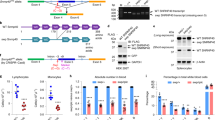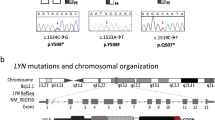Abstract
We describe mutations in the PML nuclear body protein Sp110 in the syndrome veno-occlusive disease with immunodeficiency, an autosomal recessive disorder of severe hypogammaglobulinemia, combined T and B cell immunodeficiency, absent lymph node germinal centers, absent tissue plasma cells and hepatic veno-occlusive disease. This is the first report of the involvement of a nuclear body protein in a human primary immunodeficiency and of high-penetrance genetic mutations in hepatic veno-occlusive disease.
This is a preview of subscription content, access via your institution
Access options
Subscribe to this journal
Receive 12 print issues and online access
$209.00 per year
only $17.42 per issue
Buy this article
- Purchase on Springer Link
- Instant access to full article PDF
Prices may be subject to local taxes which are calculated during checkout


Similar content being viewed by others
Accession codes
References
Mellis, C. & Bale, P.M. J. Pediatr. 88, 236–242 (1976).
Watashi, K. et al. Mol. Cell. Biol. 23, 7498–7509 (2003).
Bairoch, A. et al. Nucleic Acids Res. 33, D154–D159 (2005).
Salzer, U. et al. Nat. Genet. 37, 820–828 (2005).
McDonald, G.B. et al. Blood 101, 2043–2048 (2003).
Kadereit, S. et al. J. Biol. Chem. 268, 24432–24441 (1993).
Bloch, D.B. et al. Mol. Cell. Biol. 20, 6138–6146 (2000).
Everett, R.D. Oncogene 20, 7266–7273 (2001).
Wang, J. et al. J. Cell. Biol. 164, 515–526 (2004).
Everett, R.D. & Murray, J. J. Virol. 79, 5078–5089 (2005).
Pan, H. et al. Nature 434, 767–771 (2005).
Kingston, H.M. et al. Lancet 2, 1200 (1983).
Park, W.J. et al. Hum. Mol. Genet. 4, 1229–1233 (1995).
Elder, M.E. et al. J. Immunol. 166, 656–661 (2001).
Grimbacher, B. et al. Nat. Immunol. 4, 261–268 (2003).
Acknowledgements
We thank the families with VODI for their participation, D. Reeves for histopathological interpretation and the financial support of the New South Wales Health Research Infrastructure Grant, the Sydney Children's Hospital Foundation, the Australian National Health and Medical Research Council (NHMRC), an NHMRC postgraduate research scholarship (T.R.), the US National Institutes of Health (J.W. and G.B.M.) and the Deutsche Forschungsgemeinschaft (U.S.).
Author information
Authors and Affiliations
Corresponding author
Ethics declarations
Competing interests
The authors declare no competing financial interests.
Supplementary information
Supplementary Table 1
SP110 primer sequences. (PDF 26 kb)
Rights and permissions
About this article
Cite this article
Roscioli, T., Cliffe, S., Bloch, D. et al. Mutations in the gene encoding the PML nuclear body protein Sp110 are associated with immunodeficiency and hepatic veno-occlusive disease. Nat Genet 38, 620–622 (2006). https://doi.org/10.1038/ng1780
Received:
Accepted:
Published:
Issue Date:
DOI: https://doi.org/10.1038/ng1780
This article is cited by
-
The Genetics of Eczema Herpeticum
Clinical Reviews in Allergy & Immunology (2022)
-
Novel Missense Mutation inSP110Associated with Combined Immunodeficiency and Advanced Liver Disease Without VOD
Journal of Clinical Immunology (2020)
-
Functional domains of SP110 that modulate its transcriptional regulatory function and cellular translocation
Journal of Biomedical Science (2018)
-
Detection of Sp110 by Flow Cytometry and Application to Screening Patients for Veno-occlusive Disease with Immunodeficiency
Journal of Clinical Immunology (2017)



